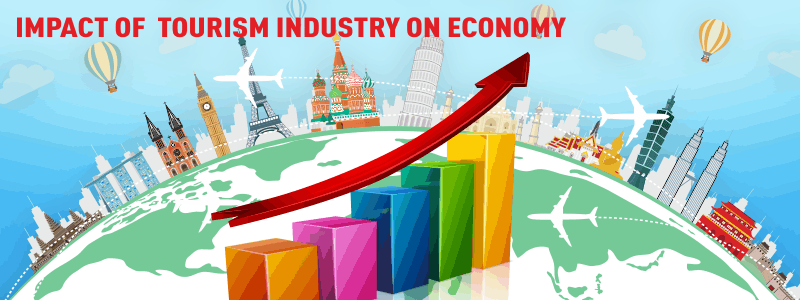Impact of Tourism Industry on Economy

Summary: In this blog, discover how travel and tourism fuel the economy—raising GDP, supporting jobs, earning foreign currency, and promoting infrastructure, while also noting challenges like higher living costs and cultural shifts.
Tourism plays a significant role in the growing economy of a country. The tourism industry of India contributes to about 9.2% of the country’s GDP. This industry can benefit the economy either directly or indirectly. Economic support to hotels, retail prices, travel prices, etc. get listed under the direct benefit category. Whereas, the government's expenditure on sector-related infrastructure and domestic investment of employees under this sector get listed under the indirect benefits. Although tourism and travel bring benefits to the economy, there are also negative impacts on the economy. Let us look at in detail below.

Positive impacts
Positive impacts on the Indian rupee by the tourism and travel industry are many. As mentioned earlier, the contributions made by this industry towards the GDP is one of the many positives.
Income and Employment
This industry produces a lot of employment options for people. Since it promotes cross-cultural studies, the sector provides opportunities for hotel management, food management, travel advisors, etc. Hence, this industry is a beneficial instrument when it comes to increasing the employment rate, thereby increasing the GDP.
Foreign exchange earnings
Tourism is an essential source of foreign exchange earnings. Increased foreign exchange results in an increased interest in tourists to venture abroad, increase their expenditure, and positively affect the length of their stay and vice versa. This loop creates a significant impact on the economy.
Developing infrastructure
Tourism promotes the development of infrastructure in a way that is beneficial to the host. Health-care, hotels, restaurants, etc. can positively affect tourists’ stay and promote increased tourism. This increase in tourism, however, is not only beneficial in an economical way but also helps in the development of healthy societal relations.
Promoting peace and stability
Tourism also promotes peace and stability in society. The income and job opportunities provided by the industry gives the people a sense of stability in their economic background, diversifying the economy, and peace of mind for a secure future. This promotes environmental awareness as well as cross-cultural studies.

Negative Impacts
Although there are positives to the economy, there are also negatives that you cannot ignore.
Undesirable social and cultural change
Tourism can sometimes lead to a tear in the social fabric. As tourists continually visit tourist spots, there are chances of that spot losing its identity. For instance, in the 1960s Goa was once a heritage spot. This was the time when hippie culture was most active. They came in thousands to celebrate life. However, their entry brought in with its negatives for the heritage spot. Drug use, prostitution, and human trafficking were on the rise. This disrupted the tranquillity of the spot. Continued disruption of culture will lead to loss of the heritage spots, which in turn will turn down the tourism of that spot.
Increase in costs of living
Tourism can cause an increase in the costs of goods and services. Increased prices lead to less consumption of products by the people, which in turn leads to a decreased economic contribution by these goods and services towards the country’s economy. In order to bring back stability, we could adopt two methods. There could be an increase in other aspects of living, and decreasing the costs of the goods and services that once were tormenting the people.
Creating a sense of antipathy
Most all-inclusive-tour packages include 80% of the cost to go into high-end flight costs and expensive hotel costs. Most hoteliers import food and other services to satisfy tourists. There is no opportunity for economic gain for the locals. This creates a sense of aversion between the locals and the government. Moreover, locals are sometimes excluded from the tourist spots. These spots become exclusive for the tourists only. This elevates the tension between the locals and the government.

Closing thoughts
Increased foreign currency exchange improves the country’s economic value. No matter how negatively and positively tourism affects the economy, it is always best to have your foreign currency at your fingertips while traveling. Exchange of foreign money can be done either online or offline. Online sites are easier to access to buy forex online with no hassle. Money changers like us carry out this work of money exchange offline, though it might be a little tedious.Travel cards are an effective way for tourists to carry their travel money. These cards, also known as forex cards, are a tourist’s best friend as they are best for money exchange during foreign visits. Doing your research is essential to buy the best Forex cards online.
• · ✦ · • Article Ends Here • · ✦ · •
Contact Us